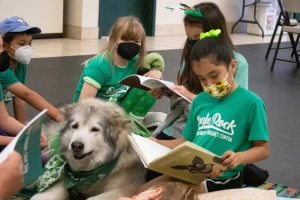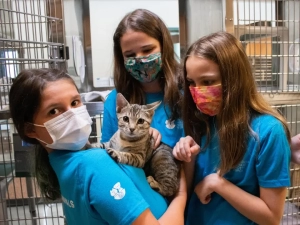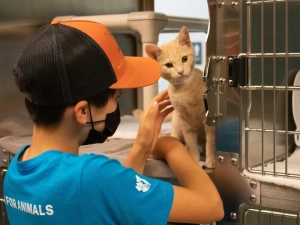Children learn compassion for animals when they take an educational class at Pasadena Humane

Pasadena Humane offers humane education programs and activities for kids of all ages. Enrollment is now open for Fall after-school clubs for kids 7 to 14 and Scout programs. Learn more at pasadenahumane.org/kids.
Last week my column ran online and in print with photos of a dog named Sally. The caption read that she had been in our care since 2018. I’m happy to report that this was a misprint. Sally’s photos and associated caption originally appeared in a column in 2019, the same year that she was adopted. Because of an editor’s error, her photos reappeared last week, and the Pasadena Star-News has apologized for the error.
At Pasadena Humane, most pets are adopted quickly, although some may take a few months to find a permanent home. For those longer-stay pets, our entire team works hard to find them loving families, while ensuring their medical, emotional and behavioral needs are met along the way.
We also offer innovative programs — like the foster-to-adopt program featured in my last column — to help our longer stay pets find homes. We all celebrate when fostering leads to adoption. And even when it doesn’t, foster homes provide pets much needed respite from the shelter.

Pasadena Humane offers humane education programs and activities for kids of all ages. Enrollment is now open for Fall after-school clubs for kids 7 to 14 and Scout programs. Learn more at pasadenahumane.org/kids.
Fostering can have benefits for foster families too, especially families with children. The best teachers for helping children to learn empathy, compassion and responsibility are often animals.
That’s why educational programming for youth has been part of Pasadena Humane’s mission since the organization’s founding in the early 1900s. Our founders believed that educating children about the humane treatment of animals was one of the most effective ways to create an enduring compassionate community. This was achieved through school and church programs, shelter tours and awareness campaigns such as Be Kind to Animals Week, which was started in 1915.
Our dedication to providing children with humane education continues to this day. We offer a variety of educational opportunities and hands-on experiences with animals that engage youth by teaching about topics such as animal care and behavior, veterinary health and careers in animal welfare.
“Most kids can really connect with animals,” explains Loni Watson, Pasadena Humane’s Director of Humane Education and Outreach. “We strive to have each child feel empowered and purposeful in how they treat animals. Being of service is one of the most fulfilling things any person can do.”
In her programming, Loni challenges kids to put the knowledge they’ve learned about animal care and behavior into practice when interacting with shelter animals and their own pets. By learning that animals are sentient beings with needs and emotions, children develop patience, understanding and selflessness.

Pasadena Humane offers humane education programs and activities for kids of all ages. Enrollment is now open for Fall after-school clubs for kids 7 to 14 and Scout programs. Learn more at pasadenahumane.org/kids.
Loni’s goal is for young participants to walk away understanding that all animals have value. I want the kids to learn that “everybody and everything matters,” she states. Her lessons are more than just about shelter animals or family pets, but about understanding “the importance of compassion towards all creatures,” including our fellow humans.
The benefits of humane education go beyond learning about animals. When children find like-minded peers, they gain confidence in themselves and become more active and engaged over the course of a program session. The connections made often lead to lasting friendships.
Tammi Yiakoumatos’ son Alex attended Critter Camp this summer. “The kids bonded really well,” shared Tammi. “They have a text circle to keep in touch since they don’t all live close.” They’ve all gotten together once since camp ended and have plans for more outings in the future.
Enrollment is now open for our Fall after-school clubs for kids 7-14 and our Scout programs. To learn more about our humane education programming or other ways kids can get involved with animals, such as volunteering, visit pasadenahumane.org/kids
Dia DuVernet is president and CEO of Pasadena Humane.
This blog post originally appeared as a column in the Pasadena Star-News on September 2, 2022.


